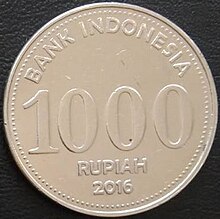The Indonesian one thousand rupiah coin (Rp1,000) is a coin of the Indonesian rupiah. It circulates alongside the 1,000-rupiah banknote. First introduced on 8 March 1993 as bimetallic coins, they are now minted as unimetallic coins, with the first of its kind appearing in 2010 and its latest revision being in 2016. As of 2024, the last two series in this denomination are legal tender.
Indonesia | |
| Value | Rp 1,000 |
|---|---|
| Mass | 4.5 g |
| Diameter | 24.1 mm |
| Thickness | 1.6 mm |
| Edge | Smooth |
| Composition | Nickel-plated steel |
| Years of minting | 1993–present (updated 2010, 2016) |
| Obverse | |
 | |
| Designer | Bank of Indonesia |
| Design date | 2016 |
| Reverse | |
 | |
| Designer | Bank of Indonesia |
| Design date | 2016 |
First issue (1993-1997, 2000) edit
This is the first issue of the 1,000-rupiah coin. Being bimetallic, it has a cupronickel outer edge and an inner circle made out of aluminum-nickel-bronze alloy. It weighs 8.6 g (0.30 oz), has a 26 mm (1.0 in) diameter, is 2.2 mm (0.087 in) thick, and has a jagged edge.[1] The coin's obverse features the national emblem Garuda Pancasila with the year of issue in its aluminum-nickel-bronze inner circle and the lettering "BANK INDONESIA" on its cupronickel outer ring, while its reverse features an oil palm in the inner circle with the lettering "KELAPA SAWIT" (oil palm) as well as "Rp1000" on the outer ring. Coins of this kind bear the mint years 1993, 1994, 1995, 1996, 1997, and 2000.[2]
This coin is subject to a controversy where several online vendors sell this coin for up to Rp100 million apiece while in reality these coins are only sold at a retail price of Rp3,000 through Rp10,000 apiece, with the highest proof-grade coins being worth up to Rp4,000,000.[3] Furthermore, this coin is also still legal tender, which means that its actual numismatic value is far more minuscule than what was initially thought.[4]
This coin was demonetised on 1 December 2023 and are exchangeable in both commercial banks and Bank Indonesia offices until 1 December 2033.[5]
Second issue (2010) edit
The Rp1,000 coin was reminted again, this time as a unimetallic coin made out of nickel-plated steel, in 2010. It was first announced on 20 July of the same year.[6] Its obverse contains the national emblem Garuda Pancasila as well as the lettering "1000 RUPIAH." Meanwhile, its reverse displays the West Javanese musical instrument angklung as well as the Gedung Sate in its capital Bandung and the lettering "ANGKLUNG" and "2010." Its diameter is 24.15 mm (0.951 in), is 1.6 mm (0.063 in) thick, weighs 4.5 g (0.16 oz), and has a smooth edge.[7]
Third issue (2016) edit
The Rp1,000 coins were redesigned on 19 December 2016. Its obverse now features the national hero I Gusti Ketut Puja, the national emblem Garuda Pancasila, and the lettering "REPUBLIK INDONESIA." Meanwhile, the reverse now contains the lettering "BANK INDONESIA," "1000 RUPIAH," and "2016," as well as a relief in the form of circles encircling its inner edge. Coins of this kind are minted with nickel-plated steel, weigh 4.5 g (0.16 oz), have a 24.1 mm (0.95 in) diameter, is 1.45 mm (0.057 in) thick, and has a smooth edge.[8]
Non-circulating commemorative coin (1970) edit
Alongside the three circulating coins, the Bank of Indonesia also once minted a silver Rp1,000 non-circulating coin to commemorate Indonesia's 25th independence anniversary in 1970. This coin weighs 40 g (1.4 oz), has a diameter of 55 mm (2.2 in), and has a reeded edge. On the obverse is the national emblem Garuda Pancasila, the Bank of Indonesia's logo, and the lettering "1945-1970" and "1000 RUPIAH" alongside the year of issue (1970). Meanwhile, the reverse of the coin features General Sudirman's portrait as well as the lettering "25 TAHUN KEMERDEKAAN" and "REPUBLIK INDONESIA."[9]
See also edit
References edit
- ^ Okezone (27 February 2022). "5 Fakta Menarik Uang Koin Rp1.000 Kelapa Sawit, Harganya Ratusan Juta? : Okezone Economy". Okezone (in Indonesian). Retrieved 13 February 2023.
- ^ "1000 Rupiah, Indonesia". en.numista.com. Retrieved 13 February 2023.
- ^ Kompas Cyber Media (20 June 2020). "Kata BI soal Uang Koin Rp 1.000 Kelapa Sawit Halaman all". KOMPAS.com (in Indonesian). Retrieved 13 February 2023.
- ^ Kusuma, Hendra. "Buat yang Belum Tahu, Uang Rp 1.000 Kelapa Sawit Masih Berlaku". detikfinance (in Indonesian). Retrieved 13 February 2023.
- ^ "Uang Koin Rp1.000 Kelapa Sawit dan Rp500 Melati Dicabut BI, Tak Bisa Dipakai Belanja". Tribunjambi.com (in Indonesian). Retrieved 1 December 2023.
- ^ "Uang Logam Rp 1.000 Baru Bernuansa Sunda". detikfinance (in Indonesian). Retrieved 13 February 2023.
- ^ "1000 Rupiah, Indonesia". en.numista.com. Retrieved 13 February 2023.
- ^ "Peraturan BI No. 18/26/PBI/2016 Tahun 2016 tentang Pengeluaran Uang Rupiah Logam Pecahan 1.000 (Seribu) Tahun Emisi 2016 [JDIH BPK RI]". peraturan.bpk.go.id. Retrieved 13 February 2023.
- ^ "1000 Rupiah, Indonesia". en.numista.com. Retrieved 13 February 2023.